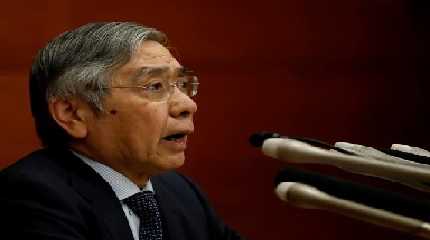
TOKYO, Apr 18 (NNN-NHK) – Bank of Japan (BOJ) Governor, Haruhiko Kuroda, said today that, recent sharp declines of the Japanese yen could negatively impact Japanese firms’ earnings outlooks and hence the nation’s already struggling economy.
“The yen’s recent depreciation against the U.S. dollar has been quite rapid,” Kuroda told a parliamentary session.
The central bank chief said, it is more desirable that currencies move stably, reflecting economic fundamentals, with his assessment of recent volatility in the currency markets, amid growing concern over the impact this could have on Japan’s fragile economy.
Kuroda’s remarks were made, as the yen plunged to a new 20-year low versus the U.S. dollar, in the upper 126 zone earlier today.
The sudden depreciation of the Japanese currency also forced Japan’s Finance Minister, Shunichi Suzuki, to say at the session that, “bad” would be a proper word to describe the yen’s recent depreciation.
Rising U.S. Treasury yields has been prompting market players to offload the Japanese currency, with the move compounded by the prospect of a widening monetary policy gap between Japan and the United States.
This is due to the U.S. Federal Reserve’s tightening of its policy to combat inflation and its suggestion of multiple rate hikes this year.
The Fed’s aggressive moves compare to the BOJ maintaining its ultra-loose monetary easing policy position, which has long-been underpinned by the bank’s overall dovish stance on monetary policy, in contrast to other central banks.
Typically, Japanese mainstay exporter firms cheer a weaker yen as it enhances price competitiveness in overseas markets and can see profits augmented when repatriated on favourable exchange rates.
However, a recent surge in prices of energy and commodity that resource-poor Japan has to import, is hurting companies’ balance sheets, due to the yen’s weakness, which is weighing on consumer spending, market analysts said.




